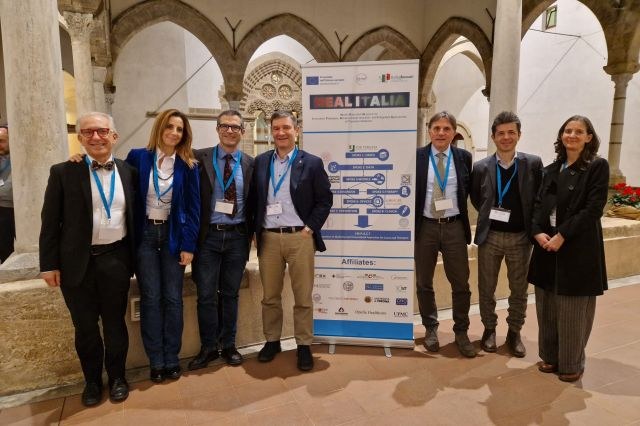Left to right: Giorgio Stassi, scientific director; Laura Leonardis, program manager; Andrea Pace, president of the HEAL ITALIA foundation; Alberto Credi, pro-rector for research at the Alma Mater; Unibo professors Marco Seri, Stefano Diciotti, Manuela Ferracin
HEAL ITALIA is the first national supply chain dedicated to research and innovation in Precision Medicine. The initiative is part of one of 14 extended partnerships promoted by the Ministery of University and Research under the mission "From Research to Enterprise" of the PNRR, with the aim of investing in innovation clusters to strengthen research supply chains at the national level and promote their participation in strategic European and global value chains.
The HEAL ITALIA project - "Health Extended ALliance for Innovative Therapies, Advanced Lab-research, and Integrated Approaches of Precision Medicine," which has a budget of 114.7 million euros, was presented by the University of Palermo, as the proposing party, along with 11 universities, the Italian National Institute of Health (ISS), five research hospitals (IRCCS), six companies and one research foundation.
HEAL ITALIA aims to generate significant advances in the field of personalized medicine within 3 years, with a focus on the identification and classification of phenotypes of rare and multifactorial diseases (cardiovascular, metabolic diseases, and cancer); the development of models for predicting prognosis and response to therapies for major "big killer" diseases; the design of innovative, personalized therapeutic strategies; the optimization of clinical and imaging biomarkers for precision; the identification of new prevention strategies based on environmental, lifestyle and clinical biometric data; and finally the clinical validation through the implementation of precision diagnostics in clinical practice and the development of artificial intelligence-driven decision-making protocols.
The University of Bologna is one of the founding universities and directly participates in the activities of all eight operational units (Spokes) that constitute the project.
"With its participation to this partnership, the University of Bologna is at the forefront of the battle against diseases with a high social and health impact through the development of innovative techniques for diagnosis and therapy tailored to the patient," says Alberto Credi, Vice Rector for Research at the Alma Mater. "The involvement of hospitals, including the IRCCS Azienda Ospedaliero-Universitaria di Bologna, and important industrial partners will foster the translation of scientific research into real-world solutions, in order to ensure that citizens receive increasingly cutting-edge healthcare."
In particular, the Alma Mater will manage the coordination of Spoke 2, dedicated to "intelligent" health, or the management of data and development of advanced methods, algorithms, and artificial intelligence approaches to integrate healthcare big data.
"The University of Bologna will coordinate the Intelligent Health Spoke focused on the use of big data to promote precision medicine in diagnostics and therapeutics," explains Stefano Diciotti, professor at the Department of Electrical, Electronic, and Information Engineering "Guglielmo Marconi" and Spoke 2 coordinator. "This will be achieved by leveraging multi-level big data storage and analysis solutions that comply with current legislation regarding the security and protection of health data; in particular, innovative artificial intelligence systems will be used to integrate data of various kinds, such as clinical, molecular and imaging data."
The project is very ambitious, as it includes eight interregional networks covering all areas of interest in precision medicine (from omics science research, new technologies for early diagnosis, drug repositioning, new protocols for primary, secondary, and tertiary prevention, and new clinical protocols for radiotherapy treatments), with the participation of many established scientists working for the first time within the same "hub." The goal is to bring solutions, innovative therapies, and early diagnosis to the patient's bedside, enabling the citizen to discover the disease as early as possible and treat it in the best possible way and offering the health care system useful solutions for the daily management of territorial services and patient caretaking.
In total, the research team consists of 350 researchers belonging to the project partners: University of Tor Vergata, Alma Mater Studiorum - University of Bologna, University of Palermo, Sapienza - University of Rome, University of Milan Bicocca, University of Modena and Reggio Emilia, Polytechnic University of Marche, University of Pisa, University of Cagliari, University of Catania, University of Foggia, University of Verona, the Istituto Superiore di Sanità, Toscana Life Sciences Foundation, IRCCS Azienda Ospedaliero-Universitaria di Bologna Sant'Orsola, BI-REX National Competence Center, IRCCS Istituto Neurologico Mediterraneo (Neuromed), IRCCS Istituti Fisioterapici Ospedalieri, IRCCS Istituto di Ricerche Farmacologiche Mario Negri, IRCCS Centro di Riferimento Oncologico di Aviano, Istituto Oncologico del Mediterraneo, Engineering Ingegneria Informatica, Sordina Iort Technologies, Sanofi CHC, UPMC Italy. A team that will be further strengthened by recruiting more than 100 new researchers and will train more than 100 PhD students.

